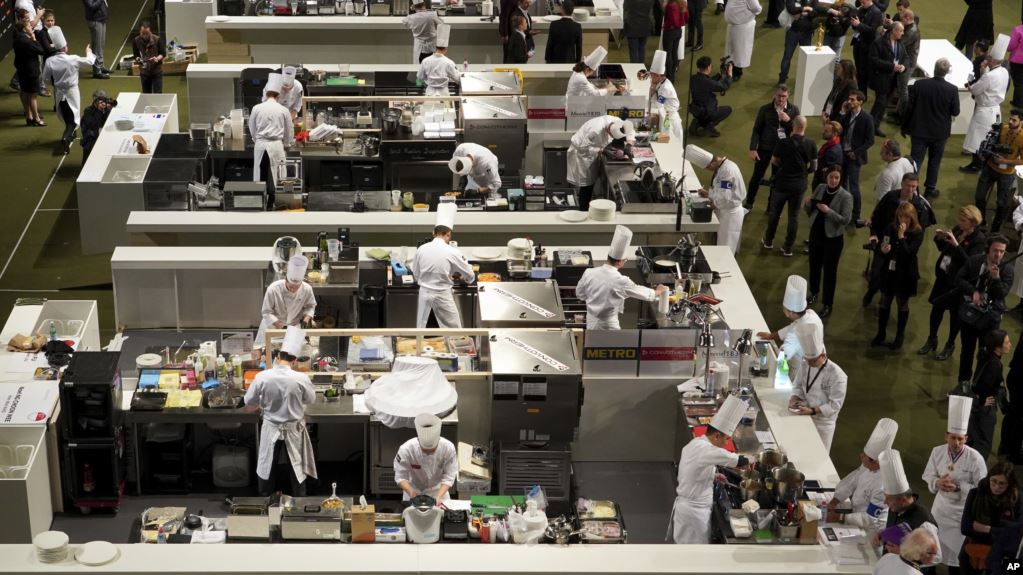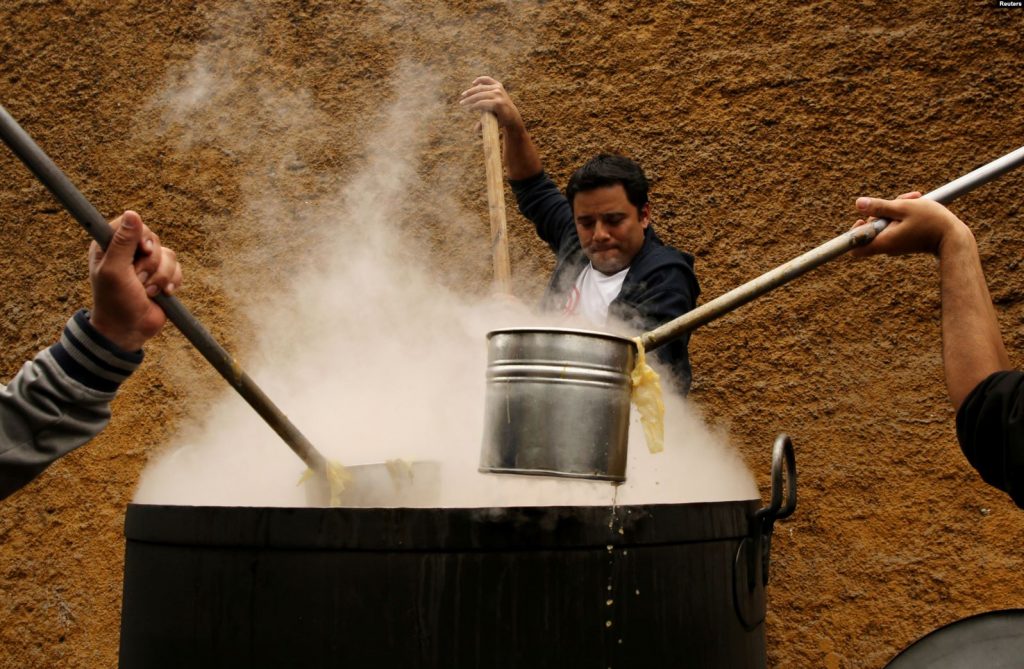پادکست VOA: اصطلاحات انگلیسی – آشپز که دوتا شد
سلام با پنجاه و هفتمین قسمت از مجموعه “Words and Their Stories” (کلمات و داستان آن ها) از سری پادکستهای VOA در خدمت شما هستیم. این مجموعه پادکست به توضیح اصطلاحات رایج زبان انگلیسی، داستان ایجاد شدنشون و نحوه استفاده از آن ها در مکالمه می پردازه. در این قسمت از پادکست VOA: اصطلاحات انگلیسی – آشپز که دوتا شد قراره با کاربرد، تاریخچه و معنی اصطلاح بسیار رایج “too many cooks spoil the soup” (آشپزهای زیاد سوپ رو خراب می کنند) آشنا بشی. در کنارش چندین کلمه ی جالب و کاربردی دیگه هم یاد میگیری که لیست این کلمه ها به همراه معنی اون ها در پایان مطلب قرار گرفته.
اصطلاح “too many cooks spoil the soup” (آشپزهای زیاد سوپ رو خراب می کنند) یعنی وقتی برای انجام یه کار آدم های زیادی وارد بشن کار خراب میشه. تو فارسی میگیم “آشپز که دوتا شد آش یا شور میشه یا بی نمک!” مخالف این اصلاح هم داریم که میگه “many hands make light work” (دست های زیاد کار رو سبک می کنه).
VOA – Words and Their hat Stories -57 :What Happens With Too Many Cooks in the Kitchen?’

متن انگلیسی پادکست VOA: اصطلاحات انگلیسی – آشپز که دوتا شد :
Now Words and Their Stories from VOA Learning English.
On today’s show we go into the kitchen.
The kitchen is not just where we prepare meals. In many places, the kitchen is the heart of the home. It is where we start our day with a cup of coffee or tea. It’s where we connect with our family and friends. We talk about our days while we make dinner or have a bite to eat. The kitchen is where we feed ourselves, body and soul.
So, it can be a very busy room in the house. Sometimes you need order in the kitchen for things to run smoothly. And sometimes you need one person to be in charge.

That’s right. Imagine you are cooking dinner for your friends. As you are making the soup, your friend Sara tastes it and says, “This needs more salt.” So, she adds more salt.
Then Harlan comes into the kitchen. He tastes your soup and says, “You didn’t put enough pepper.” So he grinds some fresh black pepper into the pot and some dried herbs.
Cecilia sees him. She tastes the soup and says, “You forgot vinegar. It’s my secret ingredient.” Then she pours in some vinegar.
You are happy to spend time with your friends. But, quite frankly, all their opinions about your soup are becoming annoying. Worst of all, you taste the soup and it’s awful!
And that is where we get the expression “too many cooks spoil the soup.” You may also hear this expression with “broth” or “dish” instead of “soup.” You can also say simply, “Too many cooks …” and English speakers will know exactly what you mean.
This expression describes an age-old problem: If too many people help to complete a task, it may not go very well. Too many people in the “kitchen” – or too many people trying to do the same task – can turn the situation into a hot mess.
But, you may ask, “If many people are trying to get something done, the task will get done faster.” After all, American English also has the expression “many hands make light work.” (This would be the opposite of “too many cooks in the kitchen.”)
To answer that point, I will draw your attention to the word “cook.” Now, the cook is the leader in the kitchen. They may have assistants to help them. But the cook has the final say.
So, what if a kitchen has many cooks? Who is the leader? Everyone! And that’s where the trouble comes in.
Maybe you have experienced this. Let’s say you are trying to do something – for example, decorate your living room. You have picked your paint and made a plan to rearrange your furniture. Then some friends come over to help. You think they are just going to do the heavy lifting and take your directions.
However, your friends think you should listen to their design ideas – like Marcus. He mixes your pale yellow paint with some dark red and covers the walls with a color you hate.
Your friend Winnie has strong opinions about the furniture. She replaces your couch and chair with big pillows. “But where will I sit?” you say. She answers, “On the floor. Look how much more room you have!”
Meanwhile, Talia decides to put red light bulbs in all your lamps and lights.
When they leave, your living room looks dark, orange, empty, scary and awful! Your mom comes over to see the results and asks, “What happened?!” You can simply answer simply, “Too many cooks, Mom. Too many cooks.”
Know that you can use this kitchen expression in any situation. Let’s hear it used at work.
Manuel, do you have a minute? I’d like to talk to you about an upcoming project.
Sure. What’s the project?
Well, I need someone to lead the new marketing account and I thought you’d be interested.
Yes, I would! Thanks.
Great! You’ll have to work with our in-house graphics department as well as our new writing staff.
Sure. But I want to be the leader of the project. If there are too many cooks in the kitchen, the project could fail.
I totally agree. You are in charge.
In other words, having too many managers and not enough workers is not a good situation.
And that brings us to the end of this Words and Their Stories.
Actually Anna, I think we should end with a new theme song.
Thanks, Bryan. But I’ve already picked out a song to end with, so…
But you are going to love it! I’m just going to play it for a second or two.
Thanks Bryan. But there are one too many cooks in the Words and Their Stories kitchen!
لیست واژگان این پادکست
soup (سوپ) – n. a food made by cooking vegetables, meat, or fish in a large amount of liquid
stew (خورشت) – n. a dish of usually meat with vegetables prepared by slow boiling
broth (آبگوشت) – n. liquid in which meat, fish, cereal grains, or vegetables have been cooked
smoothly (به نرمی) – adv. to remove problems or difficulties from a situation
ingredient (مواد تشکیل دهنده غذا) – n. one of the things that are used to make a food, product, etc.
hot mess (عامیانه: آشفتگی حسابی) – n. informal : something or someone that is emphatically a mess: such as : something in a state of extreme disorder or disarray
many hands make light work (دست های بسیار کار را سبک می کنند) _ idiom : used to say that people can do things more quickly and easily when they work together
opposite (مقابل) – adj. someone or something that is completely different from someone or something else
pale (رنگ پریده) – adj. light in color
in-house (در خانه) – adj. existing, originating, or carried on within a group or organization or its facilities : not outside
graphics (گرافیک) – adj. relating to the artistic use of pictures, shapes, and words especially in books and magazines
امیدوارم از پادکست VOA: اصطلاحات انگلیسی – آشپز که دوتا شد لذت برده باشید. برای دسترسی به قسمت های دیگر این پادکست می توانید از صفحه ی پادکست VOA: اصطلاحات انگلیسی آکادمی مجازی آموزش زبان ۲۴talk دیدن کنید.
همچنین برای گوش دادن به پادکست های سطح بندی شده British Council می توانید به صفحه ی پادکست British Council آکادمی مجازی آموزش زبان ۲۴talk یا برای گوش دادن به پادکست های BBC به صفحه ی پادکست ۶ دقیقه انگلیسی (BBC) آکادمی مجازی آموزش زبان ۲۴talk مراجعه کنید.
گوش دادن به پادکست روش خوبی برای تقویت مهارت شنیداری و هم چنین یادگرفتن کلمات در بستر یک موضوع خاصه که این به تقویت مهارت مکالمه انگلیسی نیز کمک زیادی می کنه.
اگه دنبال این هستی که مهارت های مکالمه زبان انگلیسیت رو بیشتر از این تقویت کنی بهت پیشنهاد میکنم در دورهی مکالمه زبان انگلیسی آکادمی مجازی آموزش زبان انگلیسی ۲۴talk شرکت کنی که با یه برنامه منسجم و خلاقانه کمک میکنه در زمان کوتاه بتونی به راحتی و روانی انگلیسی صحبت کنی.







